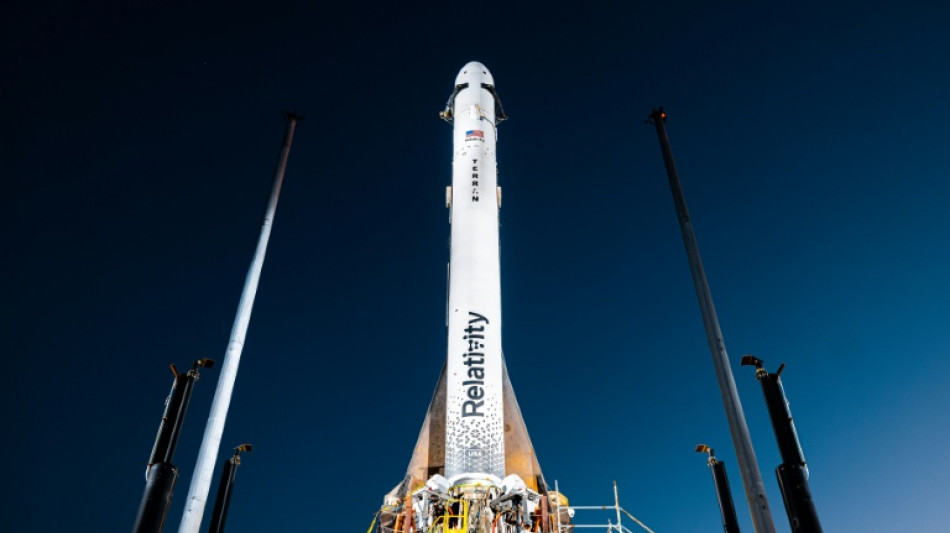
-
 Alleged Bondi shooters conducted 'tactical' training in countryside, Australian police say
Alleged Bondi shooters conducted 'tactical' training in countryside, Australian police say
-
Swiss court to hear landmark climate case against cement giant

-
 Knicks' Brunson scores 47, Bulls edge Hawks epic
Knicks' Brunson scores 47, Bulls edge Hawks epic
-
Global nuclear arms control under pressure in 2026

-
 Asian markets rally with Wall St as rate hopes rise, AI fears ease
Asian markets rally with Wall St as rate hopes rise, AI fears ease
-
Jailed Malaysian ex-PM Najib loses bid for house arrest

-
 Banned film exposes Hong Kong's censorship trend, director says
Banned film exposes Hong Kong's censorship trend, director says
-
Duffy, Patel force West Indies collapse as NZ close in on Test series win

-
 Australian state pushes tough gun laws, 'terror symbols' ban after shooting
Australian state pushes tough gun laws, 'terror symbols' ban after shooting
-
A night out on the town during Nigeria's 'Detty December'

-
 US in 'pursuit' of third oil tanker in Caribbean: official
US in 'pursuit' of third oil tanker in Caribbean: official
-
CO2 soon to be buried under North Sea oil platform

-
 Steelers edge Lions as Bears, 49ers reach playoffs
Steelers edge Lions as Bears, 49ers reach playoffs
-
India's Bollywood counts costs as star fees squeeze profits

-
 McCullum admits errors in Ashes preparations as England look to salvage pride
McCullum admits errors in Ashes preparations as England look to salvage pride
-
Pets, pedis and peppermints: When the diva is a donkey

-
 'A den of bandits': Rwanda closes thousands of evangelical churches
'A den of bandits': Rwanda closes thousands of evangelical churches
-
Southeast Asia bloc meets to press Thailand, Cambodia on truce

-
 As US battles China on AI, some companies choose Chinese
As US battles China on AI, some companies choose Chinese
-
AI resurrections of dead celebrities amuse and rankle

-
 Heirs Energies Agrees $750m Afreximbank Financing to Drive Long-Term Growth
Heirs Energies Agrees $750m Afreximbank Financing to Drive Long-Term Growth
-
Black Book Poll: "Governed AI" Emerges as the Deciding Factor in 2026 NHS Procurement

-
 Hemogenyx Pharmaceuticals PLC Announces Update on Admission of Shares
Hemogenyx Pharmaceuticals PLC Announces Update on Admission of Shares
-
Pantheon Resources PLC Announces Shareholder Letter and Corporate Update on Dubhe-1

-
 Tocvan Begins Trenching Material for the Pilot Mine and Pushes Ahead With Infrastructure Development
Tocvan Begins Trenching Material for the Pilot Mine and Pushes Ahead With Infrastructure Development
-
Steelers receiver Metcalf strikes Lions fan

-
 Morocco coach 'taking no risks' with Hakimi fitness
Morocco coach 'taking no risks' with Hakimi fitness
-
Gang members given hundreds-years-long sentences in El Salvador

-
 Chargers, Bills edge closer to playoff berths
Chargers, Bills edge closer to playoff berths
-
Gang members given hundred-years-long sentences in El Salvador

-
 Hosts Morocco off to winning start at Africa Cup of Nations
Hosts Morocco off to winning start at Africa Cup of Nations
-
No jacket required for Emery as Villa dream of title glory

-
 Amorim fears United captain Fernandes will be out 'a while'
Amorim fears United captain Fernandes will be out 'a while'
-
Nigerian government frees 130 kidnapped Catholic schoolchildren

-
 Captain Kane helps undermanned Bayern go nine clear in Bundesliga
Captain Kane helps undermanned Bayern go nine clear in Bundesliga
-
Captain Kane helps undermanned Bayern go nine clear

-
 Rogers stars as Villa beat Man Utd to boost title bid
Rogers stars as Villa beat Man Utd to boost title bid
-
Barca strengthen Liga lead at Villarreal, Atletico go third

-
 Third 'Avatar' film soars to top in N. American box office debut
Third 'Avatar' film soars to top in N. American box office debut
-
Third day of Ukraine settlement talks to begin in Miami

-
 Barcelona's Raphinha, Yamal strike in Villarreal win
Barcelona's Raphinha, Yamal strike in Villarreal win
-
Macron, on UAE visit, announces new French aircraft carrier

-
 Barca's Raphinha, Yamal strike in Villarreal win
Barca's Raphinha, Yamal strike in Villarreal win
-
Gunmen kill 9, wound 10 in South Africa bar attack

-
 Allegations of new cover-up over Epstein files
Allegations of new cover-up over Epstein files
-
Atletico go third with comfortable win at Girona

-
 Schwarz breaks World Cup duck with Alta Badia giant slalom victory
Schwarz breaks World Cup duck with Alta Badia giant slalom victory
-
Salah unaffected by Liverpool turmoil ahead of AFCON opener - Egypt coach

-
 Goggia eases her pain with World Cup super-G win as Vonn takes third
Goggia eases her pain with World Cup super-G win as Vonn takes third
-
Goggia wins World Cup super-G as Vonn takes third


Launch of world's first 3D-printed rocket canceled at last second
The launch of the world's first 3D-printed rocket was ultimately scrubbed after several tries on Saturday, marking a new setback for the private owner of an innovative spacecraft billed as being less costly to produce and fly.
Engines had begun igniting on the unmanned Terran 1 rocket, built by California aerospace startup Relativity Space, when an "automation" issue caused the company to abort takeoff for the second time in less than a week.
A little later, the company tried again to launch the spacecraft from Florida's Cape Canaveral but had to abort due to pressure issues in the rocket's second stage, the company later tweeted.
"The team went HARD today and we intend to do so during our next attempt. More to come on the new launch date," Relativity said.
At one point during the three-hour launch window, which began at 1:00 pm (1800 GMT), the countdown was put on hold when a private boat violated a danger zone.
An earlier scheduled launch last Wednesday was also postponed over last-minute propellant temperature issues.
Once it does take off, Terran 1 is set to reach low Earth orbit after eight minutes on a voyage intended to gather data and demonstrate that a 3D-printed rocket can withstand the rigors of liftoff and space flight.
If the rocket manages to attain low Earth orbit, it will be the first privately funded vehicle using methane fuel to do so on its first try, according to Relativity.
Terran 1 is not expected to carry a payload for its first flight, but the rocket will eventually be capable of putting up to 2,755 pounds (1,250 kilograms) into low Earth orbit.
The rocket is 110 feet (33.5 meters) tall with a diameter of 7.5 feet (2.2 meters).
Eighty-five percent of its mass is 3D printed with metal alloys, including the engines.
It is the largest ever 3D printed object, according to the Long Beach-based company, and is made, it says, with the world's largest 3D metal printers.
- Built in 60 days -
Relativity's goal is to produce a rocket that is 95 percent 3D printed.
Terran 1 is powered by Aeon engines using liquid oxygen and liquid natural gas -- the "propellants of the future," capable of eventually fueling a voyage to Mars, Relativity says.
Vulcan rockets being developed by United Launch Alliance and SpaceX's Starship use the same fuel.
Terran 1 has nine 3D-printed Aeon 1 engines on its first stage and one 3D-printed Aeon Vacuum engine on its second stage.
Relativity is also building a larger rocket, Terran R, capable of putting a payload of 44,000 pounds (20,000 kgs) into low Earth orbit.
The first launch of a Terran R, which is designed to be fully reusable, is scheduled for next year from Cape Canaveral.
A satellite operator can wait for years for a spot on an Arianespace or SpaceX rocket, and Relativity Space hopes to accelerate the timeline with its 3D-printed rockets.
"Long-term, a major benefit of 3D printing is the ability to more rapidly democratize space due to the incredible cost effectiveness, radical flexibility and customization," the company said.
Relativity said its 3D-printed rockets use 100 times fewer parts than traditional rockets, and can be built from raw materials in just 60 days.
Relativity has already signed commercial launch contracts worth $1.65 billion, mostly for the Terran R, according to CEO Tim Ellis, who co-founded the company in 2015.
"Medium-heavy lift is clearly where the biggest market opportunity is for the remaining decade, with a massive launch shortage in this payload class," Ellis tweeted.
P.Costa--AMWN



